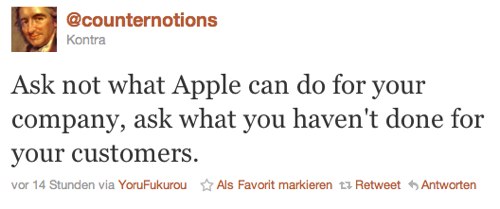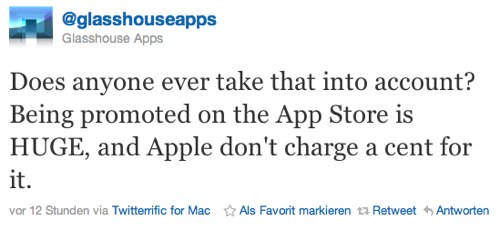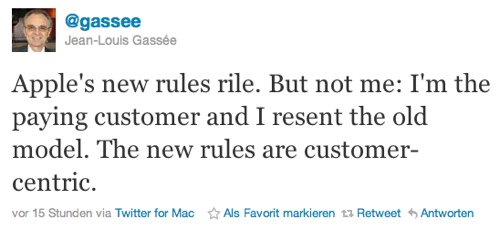24 Stunden später: Impressionen und Meinungen zum App-Store-Abo-Modell
Apple Ankündigungen sind dieser Tage gewöhnlich von allerlei Aufmerksamkeit begleitet. Für kritische diskussionswürdige Meldungen vervielfacht sich das Raunen im Nachrichtenwald. Hier einige dieser Stimmen aus den vergangenen 24-Stunden.
Pam Horan, publisher of the Online Publishers Association, says the trade organization’s members — a group that includes Time Inc., Hearst, Conde Nast, Bloomberg, National Geographic and, yes, Forbes — are worried the new regime doesn’t give them the flexibility they need to serve their customers.
Naturally, publishers also aren’t jazzed about Apple’s insistence that users have to opt in to have their information shared with publishers. […] “It limits the ability to gather audience insights to build the right products. With this inability to know who your consumers are, it really affects the ultimate product for the consumer.”
‚Sich dumm zu stellen‘, ist ein zugegeben cleverer Ansatz.
This, of course, isn’t about the readers. It’s not even about Apple’s App Store. It’s about the clash of two different business models. One that sells the customer to the highest bidder through a product and the other that sells a product directly to the customer. […] Put simply, publishers don’t want readers to opt in, because they know readers will prefer to opt out. Transparency is not a friend of publishers who for decades made a mint by selling out readers to advertisers and list brokers.
Konsumenten mit eigener Meinungen sind ganz schlimm!
Apple takes a 30 percent cut of every transaction. In other words, Apple is eating the people that provide the things that make the iPad special. […] Apple should take a cut. Just not an amount so significant it might kill the people who have helped make the iPad experience so great.
Hätten wir nur damals nicht diesen Prototypen gekauft…
The bigger question now is whether this is just Apple’s way of taking a cut of a business it helps create by virtue of the iPhone platform’s popularity, or is Apple knowingly kneecapping other streaming music services in preparation to launch its own streaming music service for the iPhone in the coming months?
Think about it: Competing music services have for years now been free to offer streaming music to iPhone users, basically giving Apple free market research data and at the same time priming the market by getting early adopters hooked on the experience. Then it comes along and changes the rules of the game, offers its own competing service, and cleans up on both ends — either stealing away users of competing service by offering a cheaper and more integrated music service itself, or profiting off its competitors subscribers without having to pay the music licensing fees they are.
‚Freie‘ beziehungsweise werbefinanzierte Dienstleistungen sind weiterhin möglich. Hohe Lizenzkosten für Musik- oder Film-Anbieter sind ohne Frage ein Problem (…übrigens auch ohne ein App-Store-Abo-Modell).
Rhapsody’s president Jon Irwin issued a statement and amongst noting that it would be “economically untenable,” he also noted that they will be “collaborating with our market peers in determining an appropriate legal and business response to this latest development.”
Obwohl kein Anspruch auf einen App-Store-Sitzplatz besteht, sehe ich die Problematik für ‚kleine‘ Anbieter, die mit Abhängigkeiten von geringen Margen arbeiten müssen.
Experts said that the first step in an antitrust analysis is to determine whether Apple is a dominant player in the market, which, in turn, requires an an assessment of the relevant market at issue.
Zwei Experten, zwei Meinungen. Das Apple in Zeiten mit ‚hunderten‘ von bevorstehenden Tablet-Ankündigungen eine ‚dominante Marktmacht‘ innehat (was die eigentlichen Medien-Inhalte betrifft) – oder gar ein Monopol – will ich nicht glauben.
With great power, comes great responsibility, and all that. But we’re not there yet. It does look like competition is coming — and fast. And so Apple should be allowed to implement the changes to their ecosystem as they see fit. The market will decide if they’re the right ones or not.
MG Siegler betont ebenfalls den ‚freien Markt’…
Wie sich die Abonnements technisch aufstellen, hat Podcast-Kollege Hetzel an dieser Stelle einmal detailliert aufgeschrieben. Durch die Bindung an den iTunes-Account lassen sich bestehende Abos automatisch an neue Geräte übertragen. Das ist komfortabel für die Kunden. Update: Inhalte sind jedoch beim ‚In-App‘-Kauf nicht außerhalb der Anwendung verfügbar. /Update
Letztendlich läuft die Diskussion auf die Frage hinaus, ob sich der App Store mit seinem Abo-Modell, der damit verbundenen (iTunes-)Werbeplattform und den rasant ansteigenden Benutzerzahlen für Anbieter von Inhalten in der Zukunft noch ignorieren lässt. Wenn man zu der Übereinkunft gelangt, das dies nicht der Fall sein sollte, gilt es sich mit den neuen jetzt durchgesetzten Regeln zu arrangieren. Einigen Anbietern wird dieser Prozess schwieriger fallen als anderen.


